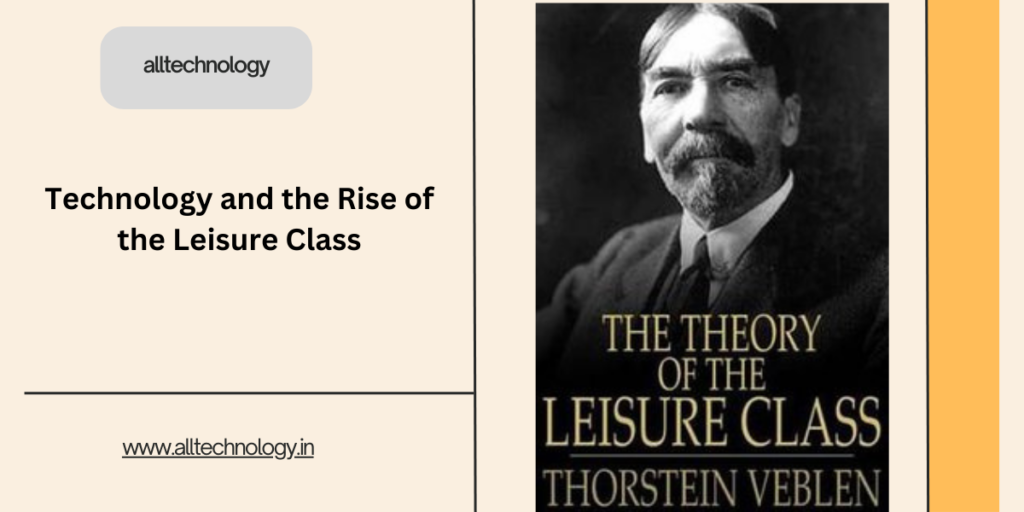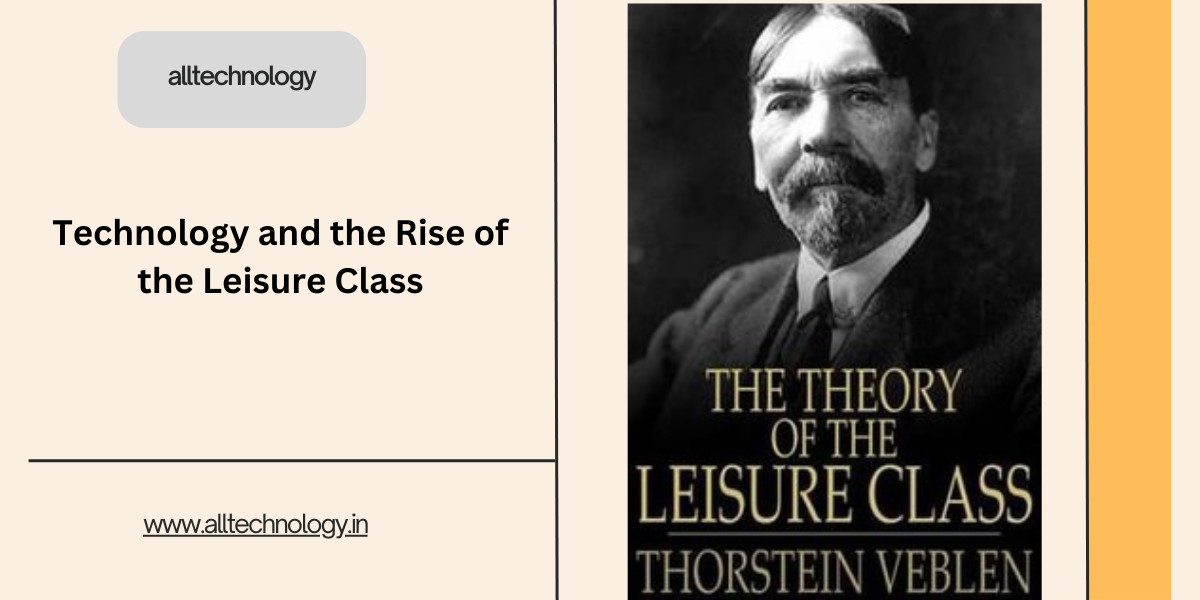Introduction
Hello Bloggers welcome alltechnology blog. In this blog you will learn Technology and the Rise of the Leisure Class .In the annals of human history, few forces have wielded as profound an impact on society as technology. From the steam engine to the internet, each technological leap has reshaped the way we live, work, and play. Yet, amidst these seismic shifts, one particularly intriguing phenomenon has emerged: the rise of the leisure class. This new social stratum, characterized by an abundance of free time and discretionary spending power, owes its existence to the relentless march of technological progress. But what exactly catalyzed this transformation, and how has it influenced contemporary life?

The Evolution of Work
At the heart of this societal metamorphosis lies the evolution of work. In the pre-industrial era, labor was synonymous with survival; people toiled from dawn till dusk just to meet their basic needs. The industrial revolution, with its mechanized production lines, began to change this dynamic, gradually reducing the hours required for manual labor. However, it was the digital revolution that truly redefined work. Automation, artificial intelligence, and the gig economy have not only altered the nature of jobs but also introduced unprecedented flexibility. For many, work is no longer a physical place but a virtual space, accessible from anywhere and at any time. This shift has liberated countless individuals from the traditional 9-to-5 grind, giving rise to a burgeoning leisure class.
Disposable Income and Consumption
The rise of the leisure class is also inextricably linked to increased disposable income. Technological advancements have driven economic growth, lifting millions out of poverty and into the middle class. With basic needs met, these individuals now have the financial means to pursue leisure activities. The proliferation of e-commerce platforms has further fueled consumption, making it easier than ever to spend money on goods and services that enhance one’s quality of life. Consequently, we see a society increasingly oriented towards experiences and consumption, from luxury travel and gourmet dining to high-end fashion and cutting-edge gadgets.
Cultural Shifts and Leisure Activities
As the leisure class expands, so too does the cultural landscape. Traditional forms of entertainment, such as cinema and theatre, have been supplemented by new media, including streaming services, video games, and virtual reality experiences. Social media platforms have created global communities where people share their leisure pursuits, further blurring the lines between work and play. Additionally, the wellness industry has boomed, with yoga, meditation, and fitness regimes becoming integral parts of daily routines. These activities are not merely pastimes; they are seen as essential components of a balanced, fulfilling life.
The Impact on Social Structures
The emergence of a leisure class has profound implications for social structures. On one hand, it has democratized access to culture and leisure, allowing more people to participate in activities once reserved for the elite. On the other hand, it has also highlighted and, in some cases, exacerbated social inequalities. While some enjoy unprecedented levels of comfort and freedom, others remain trapped in precarious employment with little opportunity for leisure. This dichotomy raises critical questions about the distribution of wealth and the role of technology in perpetuating or mitigating social disparities.
Future Prospects
Looking ahead, the trajectory of the leisure class will likely be shaped by ongoing technological innovations. The rise of artificial intelligence and robotics promises to further reduce the necessity of human labor, potentially leading to an even greater expansion of leisure time. However, this also brings challenges, such as the need for new economic models to support those displaced by automation. Additionally, the environmental impact of a consumption-driven society cannot be ignored. Sustainable practices will be crucial in ensuring that the benefits of a leisure-oriented lifestyle do not come at the expense of the planet.
Technology and the Rise of the Leisure Class
In the grand tapestry of human history, few threads are as vibrant and transformative as that of technology. From the steam engine’s first chug to the silent hum of today’s quantum computers, technology has been the relentless engine propelling society forward. However, its impact transcends mere utility, shaping not only how we work but also how we live, and, increasingly, how we leisure.
A Historical Perspective
The Industrial Revolution marked the dawn of an era where mechanization began to usurp manual labor, freeing up vast swathes of the population from the tyranny of toil. This shift didn’t just alter the economic landscape; it redefined social structures. The newfound leisure time gave birth to a burgeoning middle class, which started to value recreation and culture as essential components of life. As machinery took over repetitive tasks, humans were free to explore intellectual pursuits, art, and leisure, leading to a more enriched and diversified social fabric.
Technological Advancements and Leisure
Fast forward to the digital age, and the transformation is even more pronounced. The advent of the internet has created a hyper-connected world where information and entertainment are available at our fingertips. Smartphones, streaming services, and social media platforms have revolutionized how we spend our free time. Binge-watching a series on a lazy Sunday or engaging in an epic multiplayer online game with friends across the globe are now commonplace leisure activities.
The gig economy, facilitated by technology, has also contributed to this shift. Freelancers and remote workers enjoy more flexible schedules, blending work and leisure in ways previously unimaginable. A writer could be drafting an article on a sunny beach, while a programmer might be debugging code from a mountain cabin. This flexibility fosters a lifestyle where work and leisure coexist harmoniously, enhancing overall well-being.
Artificial Intelligence and the Future of Leisure
Looking ahead, artificial intelligence (AI) promises to further revolutionize the concept of leisure. AI-driven automation is poised to take over even more complex tasks, potentially reducing the average workweek and giving rise to what some futurists call the “leisure society.” Imagine a world where mundane chores are handled by intelligent robots, leaving humans free to pursue creative and recreational interests.
Moreover, AI is enhancing the leisure experience itself. Personalized recommendations for movies, music, and books are just the beginning. Virtual reality (VR) and augmented reality (AR) technologies, powered by sophisticated algorithms, offer immersive experiences that blur the line between the real and the virtual. One might explore ancient ruins or swim with dolphins, all from the comfort of their living room.
Economic and Social Implications
The rise of the leisure class, facilitated by technology, also brings profound economic and social implications. On one hand, there’s the potential for greater societal inequality, as those with access to advanced technologies may enjoy more leisure and better quality of life. On the other hand, there’s the democratization of leisure, where affordable technology makes recreational activities accessible to a broader audience.
Furthermore, this shift necessitates a reevaluation of our values and priorities. As leisure time increases, how do we ensure it is spent meaningfully? Education systems may need to adapt, focusing not just on preparing individuals for the workforce but also on enriching their personal lives and fostering a lifelong love of learning and exploration.
Technology and the Rise of the Leisure Class
In the annals of human history, few epochs have been as transformative as the current age of technological advancement. The confluence of innovation and automation has ushered in an era where the boundaries of work and leisure are continuously being redefined. As we delve into the intricate relationship between technology and the emergence of a new leisure class, we uncover layers of complexity that reflect a society in flux.
Automation and Workforce Evolution
The advent of sophisticated robotics and artificial intelligence (AI) has dramatically altered the landscape of employment. Tasks once deemed irreplaceable by human hands are now efficiently managed by machines. This shift has led to a paradox: while some sectors experience job displacement, others witness an unprecedented demand for new skills. The rise of the gig economy exemplifies this dichotomy, offering flexible work arrangements that challenge traditional employment paradigms.
Digital Entertainment and Cultural Consumption
The digital revolution has redefined how we consume entertainment and culture. Streaming services, virtual reality experiences, and interactive gaming have created immersive environments that blur the line between reality and fiction. These platforms not only entertain but also shape cultural norms and social interactions, fostering a global community with shared experiences yet diverse perspectives.
Education and Continuous Learning
In an age where information is at our fingertips, the pursuit of knowledge has become a lifelong endeavor. Online learning platforms and digital libraries have democratized education, making it accessible to a broader audience. This continuous learning paradigm supports a workforce that must adapt to rapid technological changes, ensuring that skills remain relevant and marketable.
Social Media and Identity Formation
Social media platforms have revolutionized the way we construct and present our identities. They serve as arenas for self-expression, allowing individuals to curate their personas and engage with a global audience. However, this phenomenon also raises questions about authenticity, privacy, and the psychological impact of virtual interactions versus face-to-face communication.
Economic Disparities and Access to Technology
While technology has the potential to bridge gaps, it also risks widening economic disparities. Access to cutting-edge technology is often limited by socioeconomic status, leading to a digital divide that can exacerbate existing inequalities. Ensuring equitable access to technology is crucial for fostering inclusive growth and preventing societal fragmentation.
The Gig Economy and Work-Life Balance
The gig economy, powered by digital platforms, offers unparalleled flexibility but also presents challenges regarding job security and benefits. Workers navigate a landscape where the lines between work and personal life are increasingly blurred, necessitating new approaches to achieving a sustainable work-life balance.
Health and Wellness in the Digital Age
Technology’s impact on health and wellness is multifaceted. Wearable devices and health apps provide individuals with tools to monitor and improve their well-being. However, the proliferation of screen time and sedentary lifestyles associated with digital consumption also poses health risks, prompting a need for strategies that promote holistic wellness.
Environmental Impact and Sustainable Practices
The technological revolution brings with it a significant environmental footprint. From electronic waste to energy consumption, the ecological implications of our digital lives are profound. Yet, technology also offers solutions for sustainability, such as smart grids, renewable energy sources, and efficient resource management systems.
Ethical Considerations in Technological Advancement
As we embrace technological progress, ethical considerations become paramount. Issues such as data privacy, surveillance, and the ethical use of AI highlight the need for robust regulatory frameworks and ethical guidelines that safeguard human rights and promote responsible innovation.
The Future of Human Creativity
Despite the rise of automation, human creativity remains an irreplaceable asset. Technology serves as an enabler, amplifying creative potential through tools that facilitate artistic expression and innovation. The interplay between human ingenuity and technological capability promises to unlock new frontiers of creativity.
Conclusion
In conclusion, technology is not just a tool for productivity; it is a catalyst for a new way of living. The rise of the leisure class is a testament to this evolution, where the fruits of technological advancements are reaped not only in our professional endeavors but in the quality and richness of our personal lives. As we stand on the cusp of even greater technological breakthroughs, the potential for a balanced, leisure-filled existence is both exciting and within reach. The challenge lies in navigating this transition thoughtfully, ensuring that the benefits of technology enhance our lives holistically.
FAQ
Question 1. How has technology changed leisure?
For example, people can now participate in virtual reality experiences that simulate real-life activities, including sports, travel, and social interactions.
Question 2. What is the main idea of The Theory of the Leisure Class?
Theoretically, the consumption of luxury products (goods and services) is limited to the leisure class.
